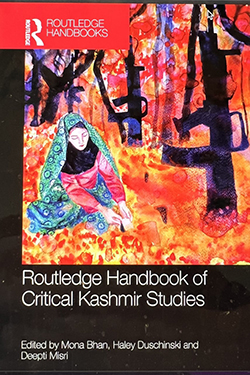Routledge Handbook of Critical Kashmir Studies
Mona Bhan, Haley Duschinski, Deepti Misri
Routledge Taylor & Francis Group, September 2022

Mona Bhan, associate professor of anthropology and Ford-Maxwell Professor of South Asian Studies, co-edited and was a contributing author to the “Routledge Handbook of Critical Kashmir Studies” (Routledge, 2022).
The handbook is organized into five sections and presents emerging knowledge frameworks and perspectives that foreground situated histories and resistance practices to challenge colonial and postcolonial forms of governance and state building. It politicizes discourses of nationalism, patriotism, democracy, and liberalism, and questions how these dominant globalist imaginaries and discourses serve institutionalized power, create hegemony and normalize domination.
The book has wide applications in fields ranging from anthropology, political science, cultural studies, legal and sociolegal studies, sociology, history, critical Indigenous studies, settler colonial studies and feminist studies.
Bhan co-edited the handbook with Haley Duschinski, associate professor of anthropology at Ohio University and Deepti Misri, associate professor of women and gender studies at the University of Colorado, Boulder. The trio co-wrote the introduction, “Critical Kashmir Studies: Settler Occupations and the Persistence of Resistance.” Bhan also co-wrote the section, “Third World Imperialism and Kashmir's Sovereignty Trap,” with Duschinski and wrote the opening to the section “Militarism, Humanism, Occupation.”
Bhan’s research focuses on border wars and counterinsurgency, militarism and humanitarianism, race, gender and religion, environmentalism and climate change, and occupation and human rights. She earned a Ph.D. from Rutgers University in 2006.
From the publisher:
The Routledge Handbook of Critical Kashmir Studies presents emerging critical knowledge frameworks and perspectives that foreground situated histories and resistance practices to challenge colonial and postcolonial forms of governance and state building. It politicizes discourses of nationalism, patriotism, democracy, and liberalism, and it questions how these dominant globalist imaginaries and discourses serve institutionalized power, create hegemony, and normalize domination. In doing so, the handbook situates Critical Kashmir Studies scholarship within global scholarly conversations on nationalism, sovereignty, indigenous movements, human rights, and international law.
The handbook is organized into the following five parts:
- Territories, Homelands, Borders
- Militarism, Humanism, Occupation
- Memories, Futures, Imaginations
- Religion, History, Politics
- Armed Conflict, Global War, Transnational Solidarities
Published in the Fall 2022 issue of the Maxwell Perspective
Related News
Media Coverage

Feb 12, 2026
Media Coverage

Jan 28, 2026
Media Coverage

Oct 30, 2025